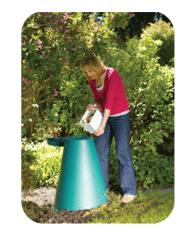Why compost?
 Up to 40% of household waste is made up of kitchen and garden waste - which is ideal for composting.
Up to 40% of household waste is made up of kitchen and garden waste - which is ideal for composting.
There are several reasons why we should be composting:
- It reduces the rubbish in your bin
- It saves you money, as there is no need to buy soil improvers or mulches
- Household compost increases the water retention of your soil, so less watering is needed in the summer.
Compost bins are available to purchase at most garden centres and many online retailers. If you are a supplier of compost bins and would like to be added to our supplier list, please email recyclemore@nwleciestershire.gov.uk.
You can also make your own compost heap by following the guidance further down this page. For further advice and support with composting, take a look at Leicestershire Master Composters.
What can be composted?
- Tea bags
- Grass cuttings
- Vegetable peelings, salad leaves and fruit scraps
- Coffee grounds and filter paper
- Spent bedding plants
- Rhubard leaves
- Young annual weeds
- Cardboard
- Egg boxes
- Scrunched up paper
- Fallen leaves
- Twigs, branches and bark
Please DON'T compost:
- Meat
- Cooked vegetables
- Dairy products
- Diseased plants
- Dog poo and cat litter
- Nappies
- Perennial weeds or weeds with seed heads
If you mainly compost kitchen waste, it is good to mix in some paper or cardboard (about one part of paper or card to every five parts of kitchen waste). This mix will maintain the correct balance of materials needed to make good compost.
How to start
Get yourself a bin or space for a heap
You can make a compost heap out of old bricks, wood or anything that comes to hand. Or you may wish to purchase a compost bin from a local garden centre or online retailer.
Find a suitable spot in your garden
The bin/heap needs to be placed on bare ground to enable worms to get in and to let moisture drain away, also make sure it is in an easily accessable point! You want to be able to get to it easily so you use it more often.
Start filling it up
You can put all sorts of organic material in your compost bin - see the list of acceptable items further up this page.
Everyone who gets a compost bin notices just how much waste is composted - especially food waste, compared with it going in the black refuse bin.
Compost bin or compost heap?
Compost heap
Piling organic material on the ground makes a compost heap!
If you want to make the area neater you can build an enclosure. This can be made out of pallets or chicken wire. If you want to produce compost quickly, it is best to turn the heap - this introduces oxygen which speeds the process up.
Compost bin
These tend to be better if you have a small garden or a small amount of material.
It's best to add large amounts of material at a time - so why not have a seperate bin in your kitchen to collect the materials in before taking them to the bin (this also saves trips to the compost bin!)
 Food waste digesters
Food waste digesters
If you have a small garden or a lot of food waste, you might find a food waste digester better suits your needs.
Food waste digesters 'digest' rather than compost your leftovers to leave a liquid residue that feeds your soil.
This means you can put in all your left over food - including cooked food, meat, fish and dairy in a food waste digester - that you cannot put in a conventional composter.
Some food waste digesters also accept garden waste, so it is worth looking at what is available.
Related Links (2)
Last updated: Thu 13 April, 2023 @ 17:07